EP 11: Asha Sanaker, Exploring Faith and Presence in Outdoor Spaces
Asha grew up attending a Quaker-operated summer camp, every year. Even after re-locating several states away, Asha sent her children to the same place as well.
As it turns out: the wild chaos of the outdoors is a great way to learn about community, responsibility, and integrity.
“If you can Carry Everything You Need to Survive on Your Back, for Five Days in a Row, that just Changes Your Perception of what You Need Globally in Your Life.”
An important idea I’ve often discussed here, is the beautiful simplicity of routine. When I interviewed Taylor Radigan — a member of the trail crew working to preserve the Grays and Torreys Trail — she laid out the simple steps for life on the mountain:
Wake
Hike
Work
Prep for tomorrow
Sleep
There aren’t a lot of frills. There also aren’t a lot of things to worry about.
This conversation happened in an extremely early episode. I imagine most of you haven’t had the chance to watch it. If you have a few minutes, it’s linked here:
Asha takes this idea a step farther, connecting this focus with the idea of being engaged in the moment.
“Embodiment is really important. Being physically present to what’s actually happening in front of me has been incredibly important to my health,” Asha said. “It’s also incredibly important to my kids.”
“Even when it’s Hard: even when it’s Raining, even when it’s Humid as Hell, even when Your Feet Hurt ‘cause You’ve got Blisters, it Still can be Joyful.”
In a recent piece, called “Home is… Damp,” Asha draws an interesting distinction between physical and spiritual comfort. Being present sometimes means enduring discomfort.
You may not have all the amenities you’re used to. But the experience brings you closer with the people who are there with you. I liken this feeling satisfyingly sore after a hard workout.
Interview Notes
1:20 — “Loud, chaotic, and people-y”
2:10 — Growing up as a Quaker
6:00 — Learning to be happy without material possessions
9:30 — Getting out of the “Infinite Opium Den”
10:30 — The satisfaction of sore
11:30 — The storm that sent us back to the Dark Ages
14:00 — Physical vs. Emotional discomfort
15:30 — Holding back the darkness
17:00 — Learning how to sit with yourself and self-reflect
19:30 — Applying physical challenges to emotional ones
25:00 — Untangling unhelpful connotations with Integrity
27:20 — How society lets us coast
32:00 — Where to find Asha
A Bit of Literal Learning
Asha describes a fascinating part of the camp experience at the end of each summer:
“They’ll roam around camp finding random bits of wood… they’ll take it to the fire circle and attach it together in some kind of crazy wonky sculpture,” she explained.
The kids are each given tiny candles, which they light and add to the wooden structure. The end result is something magical.
“The voice of this 10-year-old boy emerges out of the darkness behind me, and he says, ‘the thing I love about camp is that everyone’s individual lights are so small. But when we all put them together, they hold back the darkness.’”
I would argue this child wasn’t being poetic or looking for metaphors. I’d imagine he was being quite literal in his observations about the ceremony.
The cool thing about learning lessons in the outdoors is that physical experiences are simple and easy to grasp, yet broadly applicable to our lives back in civilization.
You may have noticed: this type of discovery and reflection is at the heart of almost all the stories you’ll read here on Cole’s Climb.
“You’re Never Done with the Work You have to do to Move Your Life Forward.”
Modern society is like driving a car along a highway: coasting is comfortable and easy. Taking your foot off the gas once in a while isn’t a problem when you have inertia to keep carrying you forward.
Many of us could — if we wanted to — coast in our responsibilities, putting in the minimum effort required to collect a paycheck. In fact, most of us could probably do nothing today without putting our survival in peril. Your access to food, water, and shelter wouldn’t be challenged until your next credit card or utility bill comes due.
There’s no pressing need to push harder. This makes it easy to fall into the hypnotic state that is the comfort zone.
Survival and self-improvement are both a primal climb up an infinite mountain. As Asha points out: you can’t stop. There is no inertia to coast on. If you want to move forward, then you need to keep pushing yourself forward.
I like the idea that Asha proposes: the chaos of the outdoors is the crucible that helps us develop attributes that the comforts of civilization inhibit:
Comfort in solitude
Quiet self-reflection
Discernment
Presence
Learning from failure
That last one is key. I’ll end with an idea Asha summed up nicely:
“And so, You get up the Next Morning, and You Try Again.
Not every day was great. some days were hard. some days we didn’t make the miles we thought we were going to make in order to reach a certain point on the trail we thought we were going to make.
Some days we were canoeing and we capsized in a rapid, and dumped all our stuff.
That doesn’t mean it’s over.”
About Asha
Asha Sanaker is a freelance writer and mother of two currently living in Upstate New York. She publishes a Substack email newsletter, Let Your Life Speak, on rediscovering the lost art of integrity. She is currently also writing a book on soulmates.
Asha has been published by Countable, Friends Journal, and The Ithaca Times. When she's not sitting somewhere writing, she loves hiking, gardening, her kids, and her old, weird cat.
You can follow Asha on Facebook, Instagram, Twitter, and of course here on Substack.

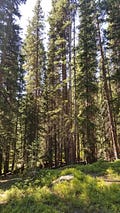












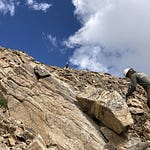
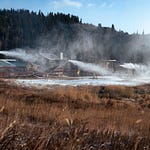

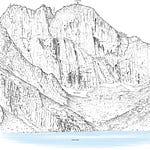


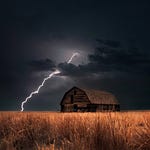
From Chaos, Integrity — Learning to Thrive Through the Outdoors with Asha Sanaker